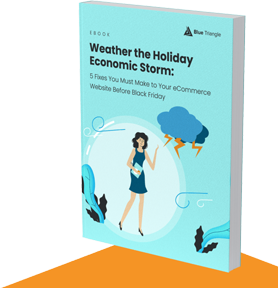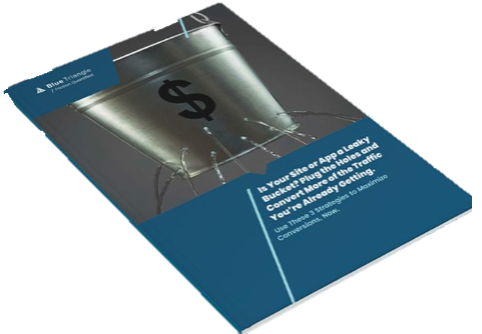Great deals are happening online during Black Friday or Cyber Monday, but the BEST deals are actually happening during other parts of the year.
When Mike Lively, Senior Vice President of Engineering at Slickdeals, stated on The Frictionless Experience, "The best deals online are not during Black Friday and Cyber Monday," it was a wake-up call to e-commerce product leaders.
While seasonal peaks like Black Friday, Cyber Monday, or even Amazon Prime Day dominate e-commerce strategy discussions, Mike's insights on managing massive traffic surges go beyond these specific events and delve into creating a consistently frictionless experience for users year-round.
Mike joined Nick Paladino and Chuck Moxley on The Frictionless Experience to share strategies for handling seasonal traffic and unexpected surges. His advice resonates for all digital platforms, not just those in retail.
Here are the key takeaways from his masterclass on platform readiness.
Recent Examples of Black Friday and Cyber Monday Website Outages
The holiday shopping season, particularly Black Friday and Cyber Monday, presents unparalleled opportunities for retailers to boost sales. However, these peak periods also expose vulnerabilities in website performance, leading to significant outages that frustrate customers and result in substantial revenue losses.
Costco: On Black Friday, Costco's website reportedly crashed, preventing customers from accessing deals and completing purchases. Frustrated shoppers encountered internal server errors and took to social media to express their dissatisfaction.]
Walmart: In 2018, Walmart's website experienced technical issues due to high demand, affecting an estimated 3.6 million shoppers and resulting in approximately $9 million in lost sales.
Major Retailer: One of our clients experienced a third-party issue that caused an outage for 90+ mins that resulted in more than $1MM lost revenue.
These incidents highlight the critical importance of robust website infrastructure and thorough preparation for peak traffic periods.
Actionable Takeaway: Conduct comprehensive load testing well before anticipated traffic surges to identify and address potential bottlenecks. Ensure your infrastructure can scale dynamically to handle increased demand, thereby minimizing the risk of outages during critical sales events.
By proactively preparing for high-traffic periods and implementing scalable solutions, retailers can provide a seamless shopping experience, maintain customer trust, and capitalize on the revenue opportunities that Black Friday and Cyber Monday offer.
Seasonality Is More Than a Date on the Calendar
While many businesses focus their preparations on well-known seasonal peaks, Lively emphasizes the importance of consistency beyond those periods.
"The thing that I feel about seasonality that I haven't heard a lot of other people say is not to forget the value you can provide to the consumer after that seasonal period is over," Mike explained.
This insight challenges the traditional narrative, urging platforms to think long-term and engage users continuously, not just during a traffic spike.
Slickdeals, for example, thrives on providing year-round value to its 10-million-strong community of deal hunters. Mike described it as a community-driven approach, where users collaborate to identify and share the best deals, creating engagement that transcends Black Friday Cyber Monday.
Actionable Takeaway: Build year-round engagement strategies to retain users and provide consistent value beyond seasonal peaks. Consider leveraging loyalty programs, content updates, and personalized recommendations to keep users coming back.
Proactive Load Testing: Preparation Meets Realism
One of Mike's core messages is the importance of proactive load testing to simulate real-world conditions during high-traffic periods. He shared a vivid anecdote about a surprise surge early in his tenure when Slickdeals was unexpectedly mentioned on "The O'Reilly Factor":
"It immediately shot our active users on the site up to about 45,000 users at just one time… It was a baptism by fire," Mike recounted.
From that experience, Mike and his team built a robust load-testing framework.
They now simulate peak traffic in production environments to identify bottlenecks before they become problems. This practice isn't limited to Black Friday or Cyber Monday but extends to other high-traffic days like Amazon Prime Day.
"We're simulating what we would expect to see over the course of Black Friday in our production environment… and that helps us find things that otherwise would have gone unnoticed until it was too late," he said.
Actionable Takeaway: Regularly conduct load testing that mimics real-world conditions to uncover bottlenecks. Use production environments where feasible to ensure tests accurately reflect user experiences.
Collaboration Across Teams Is Key
Platform readiness isn't just an engineering concern. Mike highlighted the importance of seamless collaboration across teams, including business, product, marketing, and engineering.
At Slickdeals, this collaboration begins months before peak periods.
"The biggest thing that is important for us to establish before we get into seasonal periods is: what are we doing from a marketing perspective? What is our overall strategy?" Mike explained.
By aligning these strategies early, Slickdeals ensures that every team understands the expected user flows and areas requiring the most testing and preparation. This holistic approach enables a frictionless user experience even under pressure.
Actionable Takeaway: Foster cross-team communication well ahead of seasonal peaks. Regular meetings and shared dashboards can help align strategies and ensure cohesive planning.
Managing Third-Party Dependencies
Third-party integrations are a double-edged sword during high-traffic periods. On one hand, they add functionality; on the other, they introduce risks. According to Mike, "The biggest issue during these holiday periods is actually third parties causing issues for our end users."
Slickdeals mitigates these risks by implementing a rapid tag management system. Mike praised tools like Blue Triangle, which help monitor third-party tag performance, enabling the team to disable problematic tags during critical moments without disrupting the user experience.
He noted, "You're relying on a hundred different partners to do the exact same thing… but if something fails, you need to ensure it's out of the critical render path."
Actionable Takeaway: Implement robust third-party monitoring and have mechanisms in place to disable problematic integrations quickly. Ensure non-critical tags are outside the render path to minimize disruptions.
Consistency in User Experience
Whether it's during a planned peak or an unexpected surge, providing a consistent user experience is paramount. Mike stressed the importance of this consistency:
"In either expected or unexpected periods of spikes, we need to ensure we offer a consistent experience… so users can rely on the value we're offering," he said.
For Slickdeals, this consistency extends to its interface, where machine learning and AI-driven personalization help tailor the experience to individual users.
Actionable Takeaway: Invest in personalization technologies that adapt to user behaviors, ensuring a consistent and tailored experience even during high-traffic periods.
Core Web Vitals: A New Benchmark
Google's Core Web Vitals have emerged as a crucial framework for measuring user experience, and Lively's team uses them extensively.
By focusing on these metrics, Slickdeals ensures that its site's performance aligns with user expectations, even during high-traffic periods. The team incorporates these metrics into its load-testing regimen, measuring how real users interact with the site under simulated peak conditions.
Actionable Takeaway: Monitor Core Web Vitals to identify and address performance issues that directly impact user experience. Prioritize optimizations that improve load speed, stability, and interactivity.
Building for Resilience
One of the most valuable lessons Mike shared was the importance of resilience over perfection. He emphasized that no system is immune to failure but that the key lies in having backup plans:
"It's not about preventing failures; it's about being ready to respond quickly when they inevitably happen," he said.
This philosophy drives Slickdeals' approach to managing friction. From rapidly disabling underperforming tags to preparing alternative user flows, the team focuses on mitigating impact rather than chasing perfection.
Actionable Takeaway: Develop and test contingency plans for potential failures. Ensure your team is trained to respond effectively to minimize user disruption.
Are You Ready for the Next Traffic Surge?
For product leaders, Mike's insights are a reminder that platform readiness isn't a one-time task but a continuous process. By focusing on year-round preparation, proactive load testing, cross-team collaboration, and resilience, platforms can not only survive but thrive during the next traffic surge.
As Mike put it, "Care about seasonality throughout the whole year… Don't wait until you're a month out from the traffic coming."
The next big traffic surge is always on the horizon. Will your platform be ready?
.png)
During the holiday rush, every shopper matters
Optimize the customer journey before the eCommerce event of the year.

.jpg)

.png?width=940&height=788&name=Friction%20Show%20call-out%20-%20Pull%20Quote%20(21).png)
